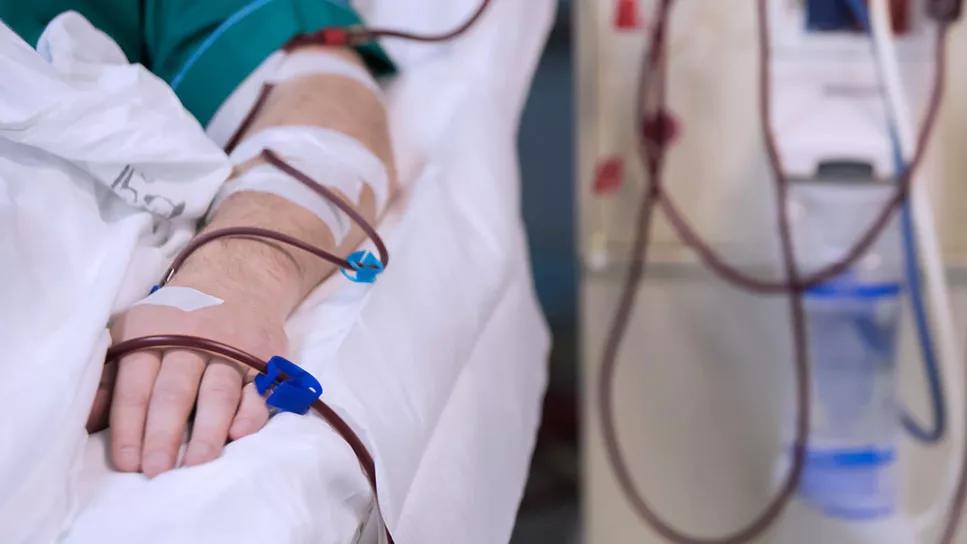New protocol reduces costs, increases patient and caregiver satisfaction

Patients with renal disease routinely receive dialysis treatments in Fairview Hospital’s five-bed dialysis unit between 7 a.m. and 5 p.m. After hours, providers can request the aid of an on-call dialysis nurse when managing a patient with more emergent needs.
Advertisement
Cleveland Clinic is a non-profit academic medical center. Advertising on our site helps support our mission. We do not endorse non-Cleveland Clinic products or services. Policy
Although some of these patients, many of whom are admitted through the emergency department (ED), do indeed require immediate, life-sustaining dialysis, others may be managed more conservatively – at least until specialists are more readily available. Making such distinctions can be difficult, however, even for seasoned clinicians – and they are not without consequences.
“Our nurses are highly responsive and prepared to see any patient in need of emergent dialysis – day or night – but returning to the hospital after hours can be challenging for caregivers,” explains Aimee Herrick, BSN, RN, Dialysis Nurse Manager at Fairview Hospital.
Prior to the COVID-19 pandemic, on-call dialysis nurses would sometimes be asked to turn around and head back to the hospital as soon as they got home in the evening. “This could be a frustrating situation for families and was contributing to caregiver turnover and burnout,” Herrick says. In addition, after-hours calls were increasing the financial burden on the dialysis unit itself in the form of overtime pay and hourly call-back costs.
In mid-2020, Herrick and her nursing team began wondering how to reduce the frequency of after-hours calls while still meeting the needs of their patients, many of whom were seriously ill.
Although hospital providers were provided with criteria designed to help them decide when to call in a nurse for emergency dialysis, the team suspected the guidelines were being used inconsistently. This resulted in potentially unnecessary after-hours calls, “which we really wanted to prevent,” Herrick says.
Advertisement
“We saw that change was needed to improve patient satisfaction, patient safety and employee engagement,” she adds.
The team’s first step was to assemble an interprofessional group to evaluate hourly call-back times and emergent cases at Fairview Hospital over a three-month period. To streamline the process, the dialysis unit created a checklist that would be used by the call-back nurse to evaluate the urgency and length of each case. This included information about dialysis start and end time and whether the patient met emergent criteria.
“We knew that the answers to our problem could be found in the data,” Herrick says. “We also believed our ability to make positive, meaningful change required us to understand how clinicians were evaluating dialysis cases.”
Herrick teamed up with Keelapandal Suresh, MD, medical director of Fairview’s dialysis unit, to review the completed checklists. Much to their surprise, nearly 61% of the after-hours cases in 2020 failed to meet truly “emergent” criteria.
“We realized that many of these unnecessary call-backs were the result of potentially ambiguous dialysis guidelines, so our first goal was to better educate hospital providers,” Herrick says.
The dialysis team began by reviewing the existing emergency dialysis criteria and making appropriate updates. The original guidelines stipulated that any case added after 5 p.m. had to be emergent, meaning that the patient must meet the following criteria:
Advertisement
Although those clinical criteria still stand, the Fairview unit’s revised dialysis protocol includes the following additions, which were developed to reduce ambiguity:
Since adopting the new dialysis criteria, Herrick says her team has seen several important improvements, including decreased overtime and hourly call-back costs; reduced employee turnover; significantly fewer nonemergent call backs; and increased patient and employee satisfaction.
Perhaps most importantly, the volume of nonemergent call backs has dropped from nearly 61% (2020) to 20% (2022). In addition, Dr. Suresh regularly discusses call-back issues with providers who request the support of a dialysis nurse for patients who did not meet the emergency criteria.
“These improvements confirm that our nursing staff is now being called in for the right reasons,” says Herrick. “By freeing up time and resources, we not only improve the lives of our caregivers, but we also create an environment in which patients with acute kidney dysfunction get the care and attention they deserve,” Herrick says.
Advertisement
Advertisement

How wellness habits help nurses flourish

Planning continues with critical, patient-focused input from nursing teams

Strengthening care through targeted resources and frontline voices

Embracing generational differences to create strong nursing teams

CRNA careers offer challenge and reward

An unexpected health scare provides a potent reminder of what patients need most from their caregivers

Cleveland Clinic Abu Dhabi initiative reduces ICU admissions and strengthens caregiver collaboration

Veteran nurse blends compassion, cutting-edge transplant training and military tradition to elevate patient care